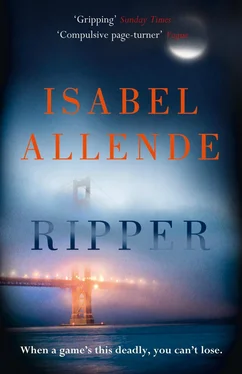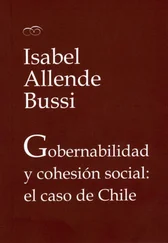Her mom’s fridge usually contained a few “magic brownies,” gifts from Matheus Pereira, which Indiana would leave there for months until they were covered with green mold and fit only for the garbage. Amanda had tried them just to be in tune with the rest of her generation, but she could not see what was so entertaining about wandering around out of her head. To her it was time wasted that might be better spent playing Ripper. But that Sunday evening, wrapped in her grandfather’s threadbare cardigan, sitting beneath the streetlamp on Union Square, she thought nostalgically about Pereira’s “space cakes”; they would have calmed her down.
By half past ten Amanda was on the point of crying, convinced that Cynthia had made a fool of her out of sheer spite. When word got around about her humiliation, she would be the laughingstock of the school. I will not cry, I will not cry, she said to herself. Just as she picked up her cell phone to call her grandfather and ask him to come and get her, a van pulled up on the corner of Geary and Powell and someone leaned halfway out the window, waving frantically to her.
Amanda rushed over, her heart pounding. Inside the van were three boys wreathed in clouds of smoke, all high as kites, including the driver. One of them got out of the passenger seat and gestured for her to sit next to the driver, a young guy with black hair who was very handsome in a Goth sort of way. “Hey, I’m Clive, Cynthia’s brother,” he introduced himself, flooring the accelerator before Amanda even had time to close the door. Amanda recalled that Cynthia had introduced them at the school Christmas concert. Clive had shown up with his parents, wearing a blue suit, white shirt, and patent leather shoes, a very different look from this guy sitting next to her with his deathly pale complexion and bags under his eyes that looked like bruises. After the school concert Clive, with mocking, overstated formality, had congratulated her on her violin solo. “See you soon, I hope,” he said, winking, as he left. Amanda was sure that she had misheard; as far as she was aware, until that moment no boy had ever looked at her twice. She decided that this must have something to do with Cynthia’s unexpected invitation. This new, ghostly version of Clive, to say nothing of his erratic driving, worried her somewhat, but at least he was someone she knew, someone she could ask to drop her off tomorrow at school in time.
Clive drove on, letting out eerie howls and drinking from a hip flask the boys were passing around, but he managed to find the Golden Gate Bridge and get onto Route 101 without crashing the car or attracting the attention of the police. In Sausalito, Cynthia and another girl climbed into the van, settled into their seats, and immediately joined in the drinking without so much as glancing at Amanda or acknowledging her greeting. With a peremptory gesture, Clive passed the hip flask to Amanda, who didn’t dare refuse. Hoping it might relax her a little, she took a sip that left her throat on fire and her eyes welling with tears; she felt foolish and out of place, as she often did when she was in a group. Worse still, she felt ridiculous, as neither of the girls had dressed up like she had. It was too late now to try and cover up her paint-streaked forearms, since she’d put her grandfather’s cardigan into her backpack before getting into the van. She tried to ignore the sarcastic whispers from the backseat. Clive took the exit at Tiburon Boulevard and drove down the long road that hugged the shore of Richardson Bay, then turned up a hill and glanced around, trying to get his bearings. When they finally arrived at their destination, Amanda saw that it was a private residence shielded from the neighboring houses by a high, seemingly impenetrable wall. Dozens of cars and motorbikes were parked out on the street. She climbed out of the van, knees trembling, and followed Clive through a dark garden. At the foot of the steps leading up to the house, she hid her backpack under a bush, but she clung to her cell phone like a life raft.
Inside were throngs of teenagers, some dancing to the deafening thump of the music, others drinking, and a few sprawled on the stairs amid bottles and beer cans. There were no lasers, no psychedelic colors, just a deserted house stripped of furniture, with a few packing cases in the living room; the air was thick with smoke, and there was a rancid stench, a mixture of paint, dope, and garbage. Amanda froze, unable to move, but Clive hugged her to his body and began to twitch to the frenetic rhythm of the music, dragging her into the living room, where everyone was dancing alone, each lost in a private little world. Someone handed her a paper cup of rum and pineapple juice, and her mouth felt so dry she drained it in three gulps. She felt herself choke with fear and claustrophobia, something that used to happen to her when, as a little girl, she would hide in her makeshift tent to escape the terrible perils of the world, the crushing presence of human beings, their oppressive odors and booming voices.
Clive kissed her neck, searching for her lips, and she responded with a smack from her cell phone that almost broke his nose but did little to discourage him. Desperate, she extricated herself from the hands slipping into the neckline of her T-shirt and up her short skirt, trying to elbow her way out. Amanda tolerated physical contact only from her immediate family and some animals; finding herself being mauled, invaded, hemmed in by other bodies, she began to howl, but the blaring music drowned out her screams. She felt as though she were at the bottom of the sea, with no air, no voice, slowly drowning.
Amanda, who usually prided herself on knowing the time without needing a watch, had no idea how long she’d spent in the house. She didn’t know whether she’d seen Cynthia and Clive again that night, or how she had managed to force her way through the crowd to hide among the packing cases on which music equipment had been set up. For what seemed an eternity, she stayed huddled inside one of the crates, doubled up like an acrobat and trembling uncontrollably, her eyes tight shut, her hands clasped over her ears. It did not occur to her to run into the street, to call her grandfather or phone her parents.
At some point the police arrived in a deafening wail of sirens, surrounded the property, and burst in, but by then Amanda was in such a state that it was twenty minutes before she realized that the chatter of teenagers and the thump of music had been replaced by the sound of orders, by whistles and screams. She steeled herself, opening her eyes and peering between the planks of her hiding place to see flashlight beams and the legs of people being rounded up by uniformed officers. A few kids tried to make a run for it, but most meekly obeyed the order to go out and line up in the street, where they were frisked for weapons and drugs and questioned, those underage being separated from the rest. They all gave the same story—they had received an invitation from a friend by SMS or on Facebook, and did not know whose house it was, or that it was unoccupied and currently up for sale, nor could they explain how they had entered the premises.
Amanda remained deathly silent inside her shelter, and no one thought to look among the crates, though two or three officers searched the rest of the house from top to bottom, opening doors and checking alcoves to make sure there were no stragglers. Gradually the interior of the house became calm, the silence broken only by the muffled sound of voices from the street, and Amanda was able to think clearly. In the silence, without the menacing presence of the partygoers, she felt the walls retreating, and she could breathe again. She had decided to wait until everyone had left before she emerged from her hiding place when suddenly she heard an officer’s commanding voice giving orders that the house be locked and guarded until a technician could come to reset the alarm system.
Читать дальше











